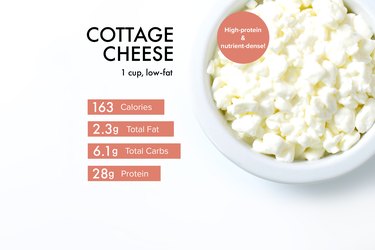
A good source of protein and bone-building calcium, cheese can certainly have a place in a well-balanced diet.
Cheese gets a bad reputation, however, because many kinds are high in dietary cholesterol, which is often associated with cardiovascular risk, according to the American Heart Association (AHA). But dietary cholesterol is different from blood cholesterol — the latter of which is linked with certain heart health concerns (more on this below).
Video of the Day
Video of the Day
In the past, federal dietary guidelines recommended limiting consumption of dietary cholesterol to 300 milligrams per day. More recent guidelines are a bit looser, and suggest keeping your consumption of dietary cholesterol, "as low as possible without compromising the nutritional adequacy of the diet," per the Dietary Guidelines for Americans, 2020-2025.
Cheese and Saturated Fat
While recommendations around eating dietary cholesterol have changed to be more flexible, cheese isn't totally off the hook. Foods that are higher in dietary cholesterol tend to be higher in saturated fat, according to the AHA. Saturated fat can raise the level of LDL cholesterol in your blood, which can increase your risk of stroke and heart disease, per the AHA.
While it's not a perfect match up, you can assume if a cheese is high in cholesterol, it is likely high in saturated fat — and that is what you want to be mindful about when it comes to heart health. The AHA recommends limiting your intake of saturated fats: Stick to approximately 5 to 6 percent of your daily calories from this source.
For a 2,000-calorie daily diet, that translates to a maximum of 120 calories from saturated fat, or 13 grams of saturated fat per day.
The chart below outlines the amount of cholesterol, fat and saturated fat content in a 1-ounce serving of some of the most popular cheeses.
Cholesterol, Fat and Saturated Fat Content in 1 oz of Cheese
Type of Cheese | Cholesterol (mg) | Fat (g) | Saturated Fat (g) |
|---|---|---|---|
Soft Goat | 13 | 6 | 4 |
Brie | 28.4 | 7.9 | 4.9 |
Provolone | 19.6 | 7.6 | 4.9 |
Low-Fat Cheddar | 6 | 2 | 1.2 |
Cheddar | 28.1 | 9.5 | 5.4 |
Low-Fat Mozzarella | 18.2 | 4.5 | 2.9 |
Blue | 21.3 | 8.2 | 5.3 |
Low-Fat Ricotta | 8.8 | 2.2 | 1.4 |
Low-Fat Cottage (2%) | 3.4 | 0.6 | 0.4 |
Parmesan (Hard) | 19.3 | 7.1 | 4.2 |
Feta | 25.3 | 6.1 | 3.8 |
Gouda | 32.4 | 7.8 | 5 |
Gorgonzola | 30 | 9 | 5 |
Camembert | 20.7 | 6.9 | 4.3 |
Swiss | 26.4 | 8.8 | 5.2 |
Cheese and Cholesterol
Cheese is an interesting food product because it can be made in a wide variety of ways. You wouldn't really compare a tub of crumbled feta to a freshly made buffalo mozzarella, after all. These differences don't just change the flavor of your food; different cheeses also have different amounts of cholesterol and fat, according to the USDA.
Certain cheeses, like Gouda and Gruyere, contain more than 30 milligrams of cholesterol per ounce. Provolone and Parmesan, on the other hand, contain fewer than 20 milligrams per ounce.
For Less Cholesterol, Choose Low-Fat Cheese
Low-fat cheeses tend to be lower in cholesterol — and saturated fat. An ounce of low-fat cheddar cheese contains just 1.2 milligrams of cholesterol, while an ounce of regular cheddar cheese contains 28 milligrams of cholesterol.
Low-fat cheeses, like low-fat cottage cheese and ricotta cheese or nonfat cheddar, have very little cholesterol. In fact, low-fat cottage cheese has only 3.4 milligrams, while nonfat cheddar has a total of 5 milligrams (low-fat, on the other hand, has 6 milligrams). Even the popular salad topper Parmesan can be a healthy choice, with just 19 milligrams per ounce. You'll notice low-fat cheeses are also low in cholesterol — a win-win for your health, especially that of your heart.
FAQ
Common Questions
Is feta cheese high in cholesterol?
Feta cheese contains 25 milligrams of cholesterol per ounce and less than 4 grams of saturated fat.
What cheese is low in fat and cholesterol?
Cheese marketed as low-fat are going to have less fat than their full-fat counterparts. These low-fat cheeses also tend to have less cholesterol than full-fat cheese. Take cottage cheese, for example:
- A 1-ounce serving of cottage cheese with 2 percent milk fat contains 3.4 mg of cholesterol and 0.65 g of fat.
- A 1-ounce serving of cottage cheese with 4 percent milk fat contains 4.8 mg of cholesterol and and 1.2 g of fat.
The differences are slight, but they can add up.
Does cheese cause high cholesterol?
Full-fat dairy — including cheese — is high in saturated fat, which can contribute to high cholesterol, according to the Cleveland Clinic.
To keep your cholesterol in check, limit your cheese intake to about 3 ounces per week, advises the Cleveland Clinic. Choose part-skim cheese and low-fat or non-fat dairy products to reduced your saturated fat intake.
What's the difference between dietary cholesterol and blood cholesterol?
This distinction is an important one! Dietary cholesterol is the cholesterol found in animal-based foods. Some common sources are high-fat meats, processed meats, eggs, butter and full-fat dairy, per the AHA.
While dietary cholesterol previously bore responsibility for being a major contributor to heart disease, more recent research walks back on the claim, finding a lack of evidence for a strong relationship between dietary cholesterol and cardiovascular risk, per the AHA. That said, foods high in cholesterol are often high in saturated fats. Saturated fats are still associated with higher risks for cardiovascular disease.
Blood cholesterol is found in the blood; it is "one of eight essential measures of heart health," per the AHA. Higher LDL cholesterol levels are associated with greater cardiovascular risk, and foods high in saturated fat can contribute to this.
So, Can Cheese Be Part of a Healthy Diet?
It's certainly possible to incorporate cheese into a healthy diet (and thank goodness for that!). But it's important to note: Cheese can contain high amounts of saturated fat — something to be mindful of, especially when it comes to heart health.
A diet high in saturated fat can increase your overall cholesterol levels. For that reason, keep your intake of saturated fat to 6 percent or less of your total caloric intake, per the AHA.
Opting for low- or reduced-fat cheese not only cuts your cholesterol intake, it also lowers how much saturated fat you eat. If you do go with full-fat cheese, adjust the rest of your diet accordingly so you're not going over those daily recommendations.
Another way to cut how much cholesterol and saturated fat you get from cheese is to use a little less. Sprinkle a small amount over tacos or burritos, and cut the amount in casseroles and other recipes by one-quarter to one-half. These types of tweaks can go a long way.
- American Heart Association: "Here's the latest on dietary cholesterol and how it fits in with a healthy diet"
- USDA National Nutrient Database: "Cholesterol Content of Selected Foods"
- Harvard Medical School: "Cholesterol: What's diet got to do with it"
- Dietary Guidelines for Americans, 2020-2025
- American Heart Association: "Saturated Fat"
- Circulation: Dietary "Cholesterol and Cardiovascular Risk: A Science Advisory From the American Heart Association"



